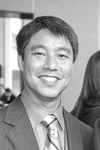
David Inoue
The sponsored ad that popped up on my Facebook feed proclaimed, “China Threat Briefing” to promote the U.S. Chamber of Commerce’s (USCC) eighth annual Cybersecurity Summit.
Curious, I clicked through to find the agenda for the meeting highlighting reports from the Department of Justice and Homeland Security about Chinese state-sponsored espionage.
There is no denying that there is a significant threat from the Chinese government to infiltrate our government, universities and corporations. Thankfully, despite the sensationalism of the advertisement, the USCC session emphasized that those engaged in espionage are a small minority of Chinese researchers, and that it is not only China, but also Iran, Russia and North Korea that pose a threat. And yet, that advertisement is problematic.
Currently in Ohio, there is an ad campaign against a referendum campaign that makes specious claims that those who sign the petition will be giving their personal information to the Chinese government and that “China is quietly invading our energy grid and coming for our Ohio jobs.” The commonality between the USCC and Ohio ads: Both leverage the fear of China in their messaging.
Japanese Americans are no strangers to this type of messaging. The 1980s were rife with talk of the threat of Japanese companies taking over. The American auto industry was threatened, and Japanese companies were buying up American properties at what they saw as bargains compared to land prices in Japan.
The result of the fear of Japanese economic dominance was the brutal killing of Vincent Chin, a Chinese American, mistaken for Japanese by unemployed auto workers. And, of course, the prewar caricatures of the Japanese led to the mass incarceration of West Coast Japanese and Japanese Americans.
As early as 1999, Taiwanese American scientist Wen Ho Lee was accused of leaking scientific information to China, only to have the government drop the charges in all but one charge of mishandling information.
In 2014, Sherry Chen was arrested on suspicion of spying, only to have the charges dropped half a year later. She has been fighting ever since to regain her job with the National Weather Service.
In the past year, there has been a surge in accusations of espionage by Chinese researchers in the U.S. In many cases, universities are taking action without any clear threat established by law enforcement because of scientists’ relations with China.
Ironically, the result of these Salem Witch trial pursuits of Chinese suspects is actually resulting in many of these researchers returning to China and most certainly performing research on behalf of the Chinese government, universities or businesses.
The result is a self-fulfilling prophecy that they are loyal to China, but only because we doubted their loyalty here. Again, this is a story Japanese Americans can relate to from the experiences of World War II.
It cannot be ignored that China as a country has much to be criticized: human rights violations, unfair trade practices and, yes, significant overseas espionage.
During WWII, Japan was the perpetrator of numerous war crimes and oppressed countries it had conquered in war with unimaginable cruelty. However, we cannot confuse the country with the people.
The danger we are running into with the hyperbole of the Chinese threat is that individuals are being swept in with the bad actions of their country of origin. Employers are dispensing with due process to terminate employees because of relations that are completely innocuous, but unfortunately are based in China. All of this begins with our perceptions.
We must push back when we see blatant racist appeals to fear that have no grounding in fact like the Ohio ads. These are the obvious places to push back. We also have to recognize the more subtle ways our perceptions are being shaped, such as the advertising for the USCC promotion of its event.
On its face, it was accurate, but it left out a lot of the rest of the story. We need balance. We can recognize the threats that the Chinese government poses without resorting to loyalty tests for Chinese and Chinese Americans who simply maintain ties to their home country.
David Inoue is executive director of the JACL. He is based in the organization’s Washington, D.C., office.



